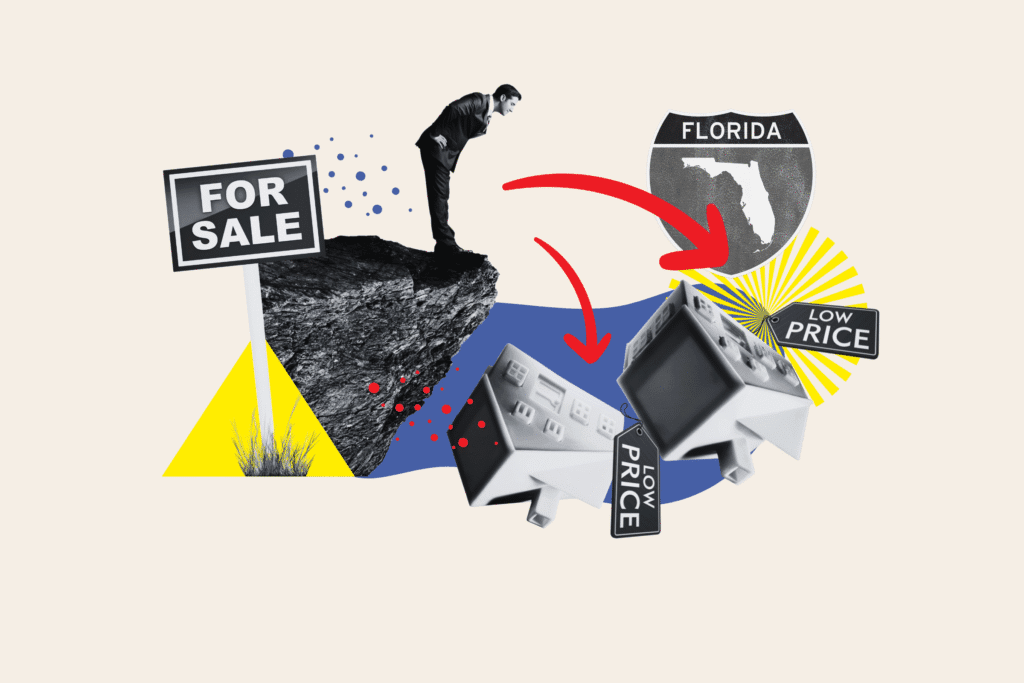Florida Housing Market Declines Rapidly as Sellers Slash Prices Amid Cooling Demand
The Florida housing market, once a red-hot hotspot during the pandemic surge, is now experiencing a swift downturn. Sellers are offering significant price reductions to attract hesitant buyers, signaling a rapid market shift. This correction follows years of surging demand and escalating prices fueled by remote work trends and increased migration to the Sunshine State.
Dramatic Price Drops Highlight Florida’s Market Slowdown
Real estate analyst Nick Gerli, CEO of Reventure, highlights the stark example of a Saint Petersburg home that epitomizes the broader market shift. Purchased by an investor in 2022 for $550,000—the height of the pandemic housing frenzy—it sold again in March 2025 for just $391,000, representing a 28% loss in three years.
- Original purchase price (2022): $550,000
- Recent sale price (2025): $391,000
- Loss: 28%
Gerli emphasizes that this price correction is not linked to property damage from hurricanes but reflects broader economic and market forces. After multiple price reductions and extended time on the market, the home finally closed at a significantly lower price.
Why Florida’s Housing Market Matters
During the COVID-19 pandemic, Florida emerged as a favored destination due to:
- Remote work enabling relocation
- More affordable living compared to urban centers
- Attractive lifestyle and climate
This surge in demand caused:
- An influx of out-of-state buyers
- Rapid home price appreciation
- Increased investor activity and new construction approvals
However, by 2024, the market dynamics shifted:
- Domestic migration slowed
- Housing costs, including insurance premiums, rose sharply
- Natural disaster risks affected buyer confidence
- Mortgage rates hit historically high levels, suppressing demand
As a result, housing prices have begun to fall, with the median sale price in Florida dropping to $409,900 in April 2025, a 3.2% decline year-over-year. Home sales also decreased by 8.8% from April 2024.
Investor Impact on Florida’s Real Estate Bubble
Investors played a significant role in fueling the housing bubble during the pandemic. In cities like Jacksonville and Orlando, investor purchases almost doubled compared to pre-pandemic levels. According to Gerli:
- Investors are now retreating amid rising interest rates and soaring insurance costs
- Rental incomes are stagnating or declining, undermining the profitability of real estate investments
- Wall Street-backed investors are particularly eager to exit the market
Key Reasons Investors Are Exiting Florida
- Higher interest rates: Increased borrowing costs reduce cash flow potential and overall returns.
- Rising holding costs: Property taxes and home insurance premiums have surged, cutting into profits.
- Declining rents: Lower rental yields weaken the financial rationale for buy-and-hold strategies.
Gerli warns that investor sell-offs are exacerbating the market downturn, forcing other homeowners to slash prices to stay competitive.
Market Insights from Economic Analysts
Hannah Jones, Senior Economic Research Analyst at Realtor.com, provides a complementary perspective:
- Investors represented less than 15% of purchases in major Florida metro areas during the pandemic.
- The primary driver of price increases was the influx of buyers relocating for affordability and lifestyle improvements.
- Increasing inventory due to new construction and existing homes on the market surpasses pre-pandemic levels.
- Buyer demand has cooled, resulting in downward price pressures.
What Buyers and Sellers Should Expect Next
For Buyers:
- Potential to secure better deals as sellers reduce asking prices
- Improved affordability may come with lower home prices and possibly lower mortgage rates in the future
- Less competition as some buyers remain sidelined due to high prices and interest rates
For Sellers:
- Pressure to adjust pricing strategies amid falling demand
- Longer time on market for certain properties, especially those previously priced at pandemic peaks
- Increased market volatility due to investor exits and changing economic conditions
Jones forecasts that Florida’s housing market will continue to experience price adjustments until macroeconomic factors like mortgage rates and buyer confidence stabilize.
Navigating Florida’s Changing Real Estate Landscape
As Florida’s housing market transitions from an overheated bubble to a more balanced state, stakeholders must stay informed about the evolving conditions:
- Monitor mortgage rates: These are a crucial driver of buyer affordability.
- Evaluate market inventory: Increased supply creates negotiation leverage for buyers.
- Watch investor activity: Their buying or selling patterns can influence local market dynamics.
- Consider regional risks: Natural disasters and insurance costs remain key factors affecting property values.
For more detailed information on the current real estate trends, visit resources like Zillow and Redfin.
Summary of Florida Housing Market Trends
| Factor | Current Status | Impact |
|---|---|---|
| Median Home Price | $409,900 (April 2025) | Down 3.2% YoY, indicating price correction |
| Home Sales Volume | 33,667 (April 2025) | Down 8.8% YoY, showing reduced buyer activity |
| Investor Purchases | Dropped 50-60% from peak | Increased supply as investors sell |
| Mortgage Rates | Historically high | Suppressing buyer demand |
| Property Taxes & Insurance | Increasing | Higher holding costs deterring investors |
| Rental Market | Declining in many areas | Weakening cash flow potential for investors |
As the Florida housing market adjusts to these new realities, prospective buyers and sellers should use caution and seek professional guidance to make informed decisions in this shifting environment.
Explore current housing market updates and analysis to stay ahead:
- Florida Housing Market Forecast 2025
- Impact of Mortgage Rates on Home Buying
- Real Estate Investment Trends in Florida
Stay informed to navigate Florida’s evolving real estate market confidently.


